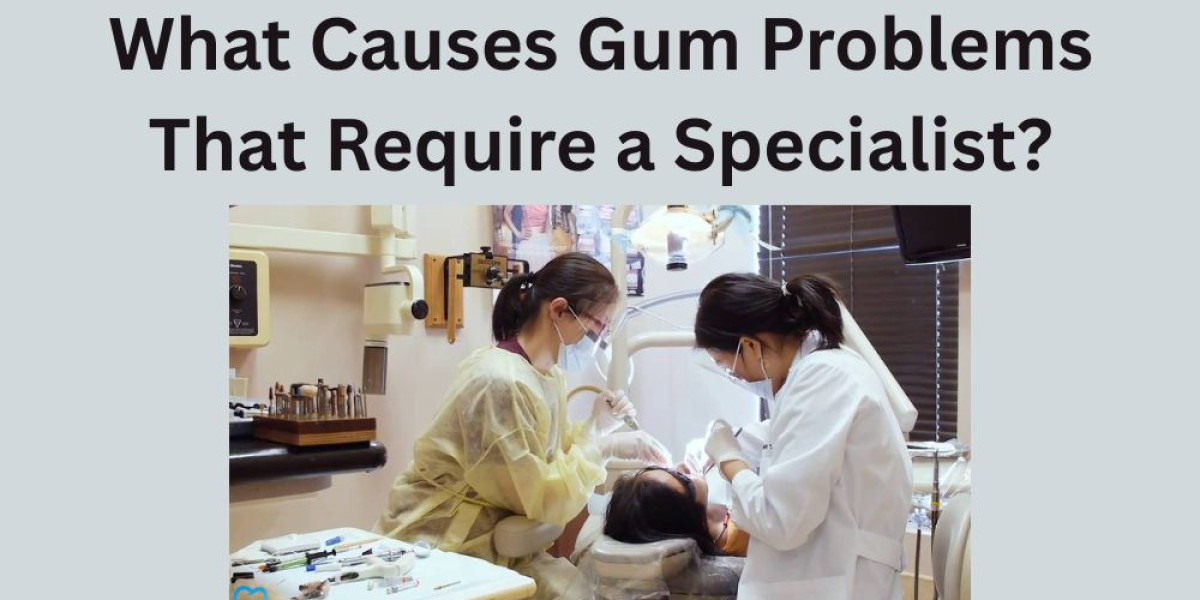Gum Health - The Foundation for a Beautiful Smile They hold your teeth in place, provide a structure for your jaw and help maintain the health of your mouth. But, gum issues are common and can become major dental problems if ignored. Occasionally, however this condition could become so bad that you’ll have to see a gum expert / periodontist for treatment.
In this article, we will tell you what causes gum issues, when they require specialist intervention and how to take care of your gums so you don’t end up with bigger problems.
Understanding Gum Problems
Note : Looking for a gum specialist in Dubai? Get expert care for healthy gums and a strong smile with experienced periodontists offering advanced treatments near you.
What Are Gum Problems?
Gum problems refer to any condition that affects the gums, such as redness, swelling, bleeding, or pain. The most common gum issues include gingivitis (early gum disease) and periodontitis (advanced gum disease). If untreated, these problems can cause teeth to loosen or even fall out.
Why a Specialist May Be Needed
While a regular dentist can treat minor gum problems, a gum specialist is trained to handle more complex cases. Specialists use advanced techniques and treatments to restore gum health and prevent further damage. Visiting a gum specialist early can save your teeth and improve your overall oral health.
Main Causes of Gum Problems

1. Poor Oral Hygiene
Why It Matters
Not brushing or flossing regularly allows plaque to build up along the gum line. Plaque is a sticky layer of bacteria that irritates the gums and leads to inflammation. Over time, it can harden into tartar, making the problem worse.
How It Leads to Serious Issues
If gum problems are ignored, gingivitis can progress into periodontitis. This can cause gum recession, bone loss, and tooth loosening. Regular cleaning, brushing, and flossing can prevent most cases of gum disease.
2. Smoking and Tobacco Use
How Smoking Affects Gums
Smoking reduces blood flow to the gums, which slows down healing and increases the risk of infection. Tobacco users are more likely to develop severe gum disease that requires specialist care.
Long-Term Effects
Continued smoking can make treatments less effective and increase the chance of tooth loss. Quitting tobacco is one of the best ways to improve gum health and prevent serious problems.
3. Poor Diet and Nutrition
Impact of Diet on Gums
A diet low in essential vitamins and minerals, especially vitamin C and calcium, can weaken your gums. Sugary foods and drinks also contribute to plaque buildup and gum disease.
Preventive Steps
Eating a balanced diet with fresh fruits, vegetables, and dairy products helps strengthen gums and teeth. Drinking plenty of water also helps wash away bacteria that cause gum problems.
4. Hormonal Changes
Who Is Affected
Hormonal changes during puberty, pregnancy, menopause, or menstruation can make gums more sensitive. Women often notice swollen or bleeding gums during these periods.
Why Specialists May Be Needed
Severe gum swelling or bleeding during hormonal changes may not improve with regular care alone. A gum specialist can provide treatment and guidance to prevent permanent damage.
5. Medical Conditions
Diseases That Affect Gums
Conditions like diabetes, heart disease, and immune system disorders can make gums more vulnerable to infection. Certain medications may also reduce saliva, increasing the risk of gum disease.
Specialist Intervention
If gum problems are linked to a medical condition, a gum specialist can coordinate with your doctor to provide safe and effective treatment.
6. Genetic Factors
Some people are naturally more prone to gum disease due to genetics. Even with good oral hygiene, they may develop gum problems that need specialist care.
Signs You Need to See a Gum Specialist
Common Symptoms
Persistent bleeding when brushing or flossing
Swollen, red, or tender gums
Receding gums or longer-looking teeth
Loose or shifting teeth
Bad breath that does not go away
Why Early Intervention Matters
Seeing a gum specialist early can prevent irreversible damage. Treatments may include deep cleaning, medications, or minor surgeries to restore gum health.
How to Protect Your Gums
Maintain Good Oral Hygiene
Brush at least twice a day, floss daily, and use an antibacterial mouthwash. Regular cleaning removes plaque before it turns into tartar.
Healthy Lifestyle Choices
Avoid smoking, eat a balanced diet, and stay hydrated. Healthy habits reduce the risk of severe gum problems.
Regular Dental Checkups
Even if your gums feel fine, regular visits to your dentist or gum specialist help catch problems early. Preventive care is cheaper and less painful than treating advanced disease.
Final Thoughts
Unless you're actively looking for it, you probably won't notice some bleeding of your gums," he added. Legacy factors include poor oral cleanliness, smoking and mastication, unhealthy dieting and hormonal changes that promote inflammation. General dentists can handle mild gum problems, but severe or recurring issues call for a gum specialist.
You can avoid serious troubles with your gums by looking after them through good brushing, flossing, eating well and regular dental visits.” If you recognize symptoms such as bleeding, puffiness or wiggly teeth, make an appointment to see a gum expert now, so your smile’s future is safeguarded.










